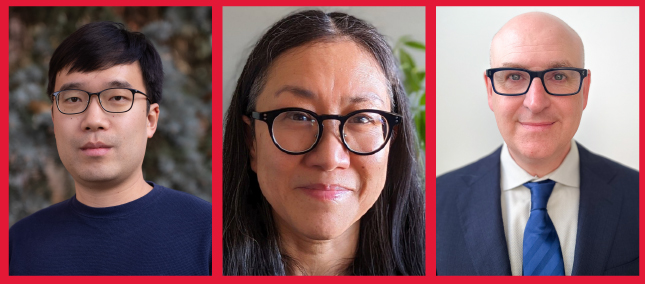
Seven York University researchers have received new infrastructure funding from the Canada Foundation for Innovation (CFI) for a wide range of projects, including the use of artificial intelligence (AI) in personalized medicine, Indigenous reconciliation through immersive technologies, a psychological study of spontaneous thought and more.
The York researchers received a combined total of $745,204 from CFI’s John R. Evans Leaders Fund (JELF), which supports institutions in attracting top talent and acquiring the state-of-the-art tools and equipment necessary to enable their innovative work.
“We are grateful for CFI’s investment in our researchers, who continuously push the boundaries of art, science and technology,” said Amir Asif, vice-president research and innovation. “The John R. Evans Leaders Fund supports York’s commitment to research excellence in all its forms, including the diversity of these projects that range from developing new techniques in genetic engineering and biomolecular spectroscopy to advancing mental health studies to using [extended reality] technologies to promote greater inclusivity in the arts.”
The professors who are JELF recipients from York are:

Buddhika Bellana, Department of Psychology, Glendon College
Project: Persistence of recent experiences in memory via spontaneous thought
Amount: $90,376
Bellana’s research is focused on why some experiences preoccupy people, lingering in their spontaneous thoughts for longer than others. The CFI funding will support the development of a computational model to predict the kinds of events that are likely to influence thoughts, in addition to exploring how physiological signals – like heart rate – can predict when an event will linger in mind. Bellana’s work aspires to advance the scientific understanding of memory, spontaneous thoughts, and mental health conditions like anxiety and depression.
Anna Hudson, Department of Visual Art & Art History, School of the Arts, Media, Performance & Design
Project: Curating Reconciliation through XR Immersive Technologies
Amount: $83,308
Hudson’s research-creation project utilizes the latest in virtual reality (VR) and other extended reality (XR) technologies to promote Indigenous storytelling and facilitate community building and knowledge sharing. The project aims to foster equity, diversity and inclusion, and involves three immersive experiences: Indigenous-designed VR galleries; a smartphone app that allows users to explore Indigenous histories and perspectives; and an interactive archive kiosk that challenges colonial narratives about First Nations, Métis and Inuit peoples.
Terry Sachlos, Department of Mechanical Engineering, Lassonde School of Engineering
Project: Establishment of an AI-guided Personalized Medicine Discovery Facility
Amount: $140,000
Sachlos and his research team have developed a 3D bone marrow microenvironment to keep leukemic stem cells alive longer outside the body, which enhances experimental drug testing on the blood cancer. Working in collaboration with Lassonde colleagues Aijun An and Laleh Seyyed-Kalantari, the project aims to use AI to identify and test existing U.S. Food and Drug Administration-approved drugs tailored to each patient's unique leukemia genetics. Once fully operational, their facility will be able to uncover a personalized drug regimen for leukemia patients within several weeks after receiving a biopsy.
Arik Senderovich, School of Information Technology, Faculty of Liberal Arts & Professional Studies
Project: Data Analytics in Services
Amount: $76,520
CFI funding will help Senderovich establish the Data Analytics in Services (DAISE) Lab, which will focus on developing data analytics technologies to improve service systems by making them more accessible, efficient and of higher quality. A multidisciplinary team of researchers will lead efforts in areas such as responsible data science, process mining, operations management in services, as well as AI and machine learning. The lab aims to advance research from early stages to fully implementable software solutions, utilizing advanced computational power and secure storage capabilities to address real-world challenges in service systems

Yongjoo Bill Kim, Department of Chemistry, Faculty of Science
Project: Methods to Create Mutations in Cells to Understand and Treat Disease
Amount: $100,000
Kim’s project will involve the creation of new technologies and special tools for protein engineering and genome editing, enabling him and his lab to alter the genetic code of cells. This type of innovation will advance Kim’s study of the genetic differences of various diseases, including cancer, diabetes and heart disease, in the hope it can also be used to help find better treatments. In addition, the researchers believe this new technology holds the potential to grow more climate-resilient plants and could be adopted by Canadian pharmaceutical companies and agriculture businesses for future applications.
Taien Ng-Chan, Department of Cinema & Media Arts, School of the Arts, Media, Performance & Design
Project: Marginal MediaWorks
Amount: $100,000
Ng-Chan plans to leverage XR technologies – such as augmented and virtual reality – to help foster greater inclusivity in the arts and media industries. The sectors currently lack representation from intersectional, marginalized groups, including by race, gender, sexual orientation and disability. Partnering with community arts organizations and artist-run centres, the project will allow for community building, research creation, and the equitable development and exchange of knowledge. Incorporating a decolonial mode of governance, Ng-Chan and her team aim to boost the capacity of partnering organizations that are struggling to adapt to emerging technologies. The goal is to better address the needs of their members as well as to promote increased diversity among people working in the creative sector.
Logan Donaldson, Department of Biology, Faculty of Science
Project: An Advanced Platform for Biomolecular NMR Spectroscopy
Amount: $155,000
The funding will support an upgrade of the electronics to the high-field 700 MHz nuclear magnetic resonance spectrometer in the Life Sciences Building. The Avance-Neo platform upgrade will provide a new opportunity for Donaldson and 12 other researchers affiliated with the York U YSciCore facility to obtain the most sensitive and detailed information of biomolecules linked to neurodegenerative disease, biosensor design, antibiotic resistance and vaccine development. The funding also provides support for an intensive computing platform that will enable AI design of new biomolecules with therapeutic and diagnostic potentials.
